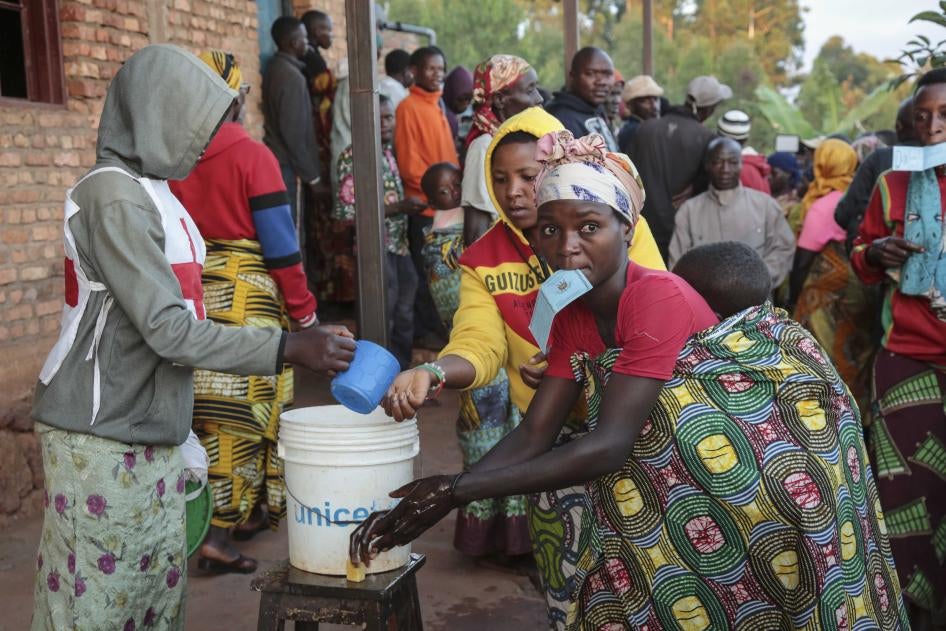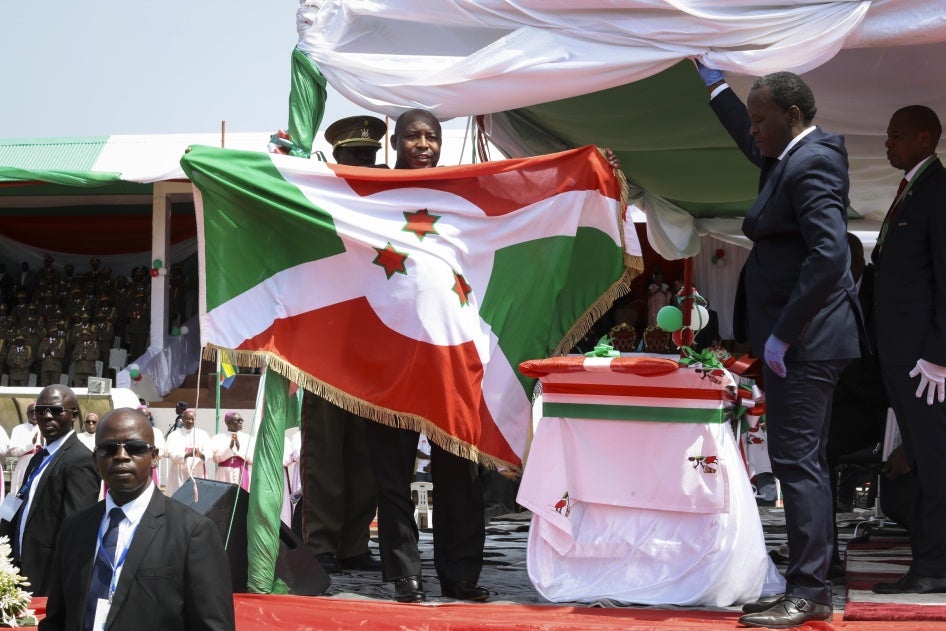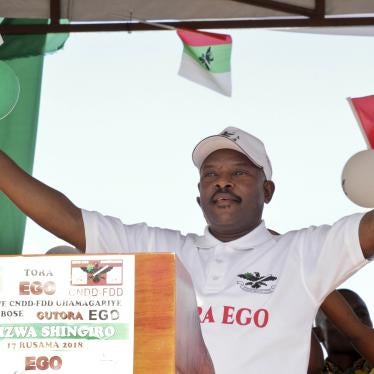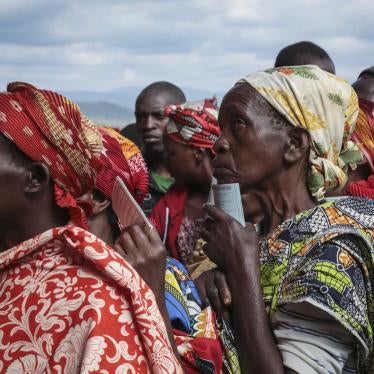(Nairobi) – Burundi’s government is failing to communicate fact-based information on the Covid-19 pandemic and preventing doctors and nurses from responding adequately.
The government’s response is fueling fear and rumors about the spread of the disease. Burundi’s new leadership should ensure that people have access to accurate, scientific, and evidence-based information essential to protecting their health.
“The authorities’ reckless approach to the pandemic is adding further uncertainty and fear to an already politically charged atmosphere when accurate statistics and transparency are needed to save lives,” said Lewis Mudge, Central Africa director at Human Rights Watch. “Burundi’s new president should make responding to Covid-19 a priority and ramp up testing to know the true extent of the coronavirus outbreak in the country.”
Human Rights Watch has interviewed several healthcare workers and experts in recent weeks about the situation. All those interviewed requested anonymity and that the name of their hospital be withheld, citing fear of retaliation by the Health Ministry or security services against themselves or their colleagues. Several said they felt their lives were at risk for speaking out about the situation.
Burundi has confirmed 144 cases and 1 death. However, several medical workers and experts interviewed raised concerns about an increase in cases with Covid-19 symptoms and alleged that the government-managed National Institute for Public Health (Institut national de santé publique, INSP) and the authorities refuse to carry out tests or adequately report on the pandemic. On May 12, 2020, the government declared persona non grata the World Health Organization’s country director, two senior staff members, and a consultant supporting the public health response to the virus.
Former president Pierre Nkurunziza died on June 8, officially of a cardiac arrest, a government statement said, days after the constitutional court declared the victory of his party’s candidate, Évariste Ndayishimiye, in the May presidential elections. Nkurunziza, his wife, and the health minister had been hospitalized in recent weeks, although no official reason was given.
During his swearing-in ceremony on June 18, Ndayishimiye thanked God for the low reported coronavirus transmission and mortality rates, and urged Burundians to take all possible measures to prevent the spread of the virus.
Since March, high-level government officials, including Nkurunziza and Ndayishimiye, had downplayed the threat of the virus. During a speech on April 5, Ndayishimiye said: “Some are locked up at home, but God has accepted that we gather…. God loves Burundi… and if some have contracted the coronavirus, it’s so that divine action can transpire.” During the election campaign, which started on April 27, both Nkurunziza and Ndayishimiye participated in numerous rallies for thousands of people without adequate social distancing measures. The opposition also organized large gatherings during the campaign.
A nurse working at a private hospital in Bujumbura, the economic capital, said on June 8:
Last week, six to eight people were hospitalized with Covid-19 symptoms.… Three or four [of these] people died. When they come, they are already in a critical state. Some had attended the campaign rallies; one died [three days ago]. If the president denies the existence of the illness, how can a simple citizen admit that they’ve got it?
Reports of people dying of Covid-19 have increased in recent weeks. Human Rights Watch spoke with a 38-year-old man in Bujumbura who said he had lost two family members to Covid-19 over the last two weeks. He said that although doctors were not able to carry out tests, they had confirmed the diagnosis because symptoms aligned with Covid-19 and recommended that the family isolate themselves. “We are afraid, but we can’t talk about it,” he said. “People are dying.”
In April, the government adopted directives on how healthcare facilities should respond to the virus, but doctors said these were only presented to them in June. The directives state that from their adoption, 5,000 tests would be carried out daily across the country for 3 months. They created a toll-free number for hospitals to call about suspected cases.
But healthcare workers and experts said that the authorities downplayed the gravity of the pandemic and restricted their testing capacity, making the protocol outlined in the directive ineffective. They also said that the toll-free number was often unanswered, or that testing delays meant patients suspected of having Covid-19 died before a diagnosis could be confirmed.
Healthcare workers outside of Bujumbura said it was difficult to get suspected cases tested, because local Health Ministry representatives did not always allow them to report the cases and the body carrying out tests, the INSP, was based in Bujumbura.
One doctor working at a public hospital in Bujumbura said: “Often, patients die without being tested, even when we call [the INSP] to come do one. This is very common, and the tests are very rare. The number of confirmed cases is much lower than what we are actually seeing in the hospital.”
Healthcare workers also said that the government’s guidelines on protective equipment were ineffective due to the persistent shortage of personal protective equipment and medical masks. Recently, media reports have emerged of medical workers contracting the disease. A doctor working at a public hospital in Bujumbura said: “I’m worried because we are not protected and there is not enough space for all the patients.”
Some people interviewed said their supervisors told them not to speak about equipment shortages or symptom patterns in their hospitals. “We are not allowed to talk about the situation,” said a doctor working at a public hospital in Bujumbura. “The hospital director told us only the Ministry of Health can share information. They told us that if we see a suspected case, we shouldn’t talk about it.”
Two healthcare workers at a public hospital in Ngozi confirmed that patients who they suspected of having Covid-19 were regularly coming in for treatment. They said suspected cases included some patients transferred from Ngozi Prison. In recent weeks, local monitoring groups and media have reported cases of prisoners dying after developing respiratory problems in Bujumbura’s Mpimba Central Prison and Ngozi Prison.
In its 2019 annual report, Burundi’s National Independent Human Rights Commission, the CNIDH, said the country’s prisons were at 273.3 percent capacity, and that about half of the prisoners were in pretrial detention. Many prisoners were arrested for political reasons, have served their sentence, been acquitted, or are eligible for release.
A prisoner in Ngozi Prison contacted by phone said he feared that the authorities were not responding to the possible Covid-19 outbreak adequately: “We’re told there’s already been five deaths from Covid-19. Some prisoners are meant to be in quarantine but they’re still moving around the prison freely. Otherwise, measures to prevent it from spreading are only handwashing signs. The prisons are so overcrowded, it’s impossible.”
Burundi’s overcrowded and unsanitary prisons are at grave risk of Covid-19 outbreaks that threaten the health and lives of detainees, guards, and the broader population. Political prisoners, people detained for human rights work or exercising freedom of expression, and people in pretrial detention for low-level or nonviolent offenses should be released immediately, Human Rights Watch said.
Under international human rights law, the Burundian government has an obligation to protect the right to freedom of expression, including the right to seek, receive, and impart information of all kinds. Governments are responsible for providing information necessary for protecting and promoting rights, including the right to health. Permissible restrictions on freedom of expression for reasons of public health may not put in jeopardy the right itself. A rights-respecting response to Covid-19 needs to ensure that accurate and up-to-date information about the virus is readily available and accessible to all.
The government’s initial response to the pandemic included suspending all inbound and outbound passenger flights, a 14-day self-funded quarantine for passengers arriving from affected countries, and a call on security forces to help enforce hygiene and sanitation measures in public places. But a government statement dated March 25 reiterated that “only the grace of God has protected Burundi” from Covid-19, and threatened those who take preventive measures ahead of the government.
“Healthcare workers’ fear of retaliation and inability to transparently report on the situation is aggravating the unfolding Covid-19 pandemic,” Mudge said. “To avoid preventable deaths from this pandemic, Burundi’s regional and international partners should press the government to ensure that people have access to accurate, evidence-based information essential to protecting their health. Until now, Burundi’s leaders have done everything but that.”










